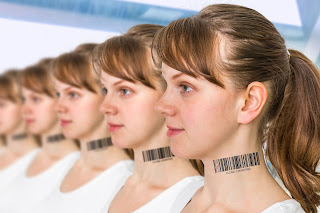 |
This week, some papers have been published suggesting we're close to understanding how to control the behaviour of autistic people. How? By altering our body's internal 'programming', its genetics. One of these papers even compared us to cows who need their own 'programming' altered to make them more tame. Why? So cow-handlers don't have to bother earning the trust of the cows. They can just make cows that do exactly what they're asked to do.
I know some will immediately say, "Well, hey, autistic kids are badly behaved, right? Don't we need this stuff, so they behave better?"
I've done quite a bit of research into the dodgy stuff published about our alleged 'bad behaviour'. Here is some of it. https://annsautism.blogspot.com/2020/05/autism-and-myths-around-violence.html Summary - oops, we forgot to mention that generally, non-autistic children are more violent than the autistic ones. We also forgot to mention that we hadn't even found most of the peaceful autistic children, in most studies. Why? Because we were mostly only looking for, and diagnosing, the ones who were disruptive in classes and in the family home. Huge numbers make it through to adulthood without a diagnosis. They're not on any research paper, because no-one even realised they've been autistic all their lives. The research we had about autistic 'behaviour' was dodgy as hell, in other words.
And here is a link to a lot more modern research into autism. https://annsautism.blogspot.com/2019/01/autism-some-vital-research-links.html
About genuine difference, not fault. About genuinely different social communication that is every bit as effective. About honesty, integrity, dedication, concentration, fairness. Unfortunately, too many papers still use research that dates right the way back from last century, when we'd only found a few autistic people, most of them in care homes. No wonder we misunderstood autism, eh?
So, we have these genetics papers. Each promising a Golden Future where these 'badly behaved autistic kids' suddenly become perfect little robots, just by taking drug X, or Y. Well, that's the plan, as soon as they can make drugs X and Y of course.
But, wait. What makes society think that this would only work on autistic children?
What's to stop someone saying, "Hey, this could work on gay people - we could alter their behaviour to turn 'em straight!"
What's to stop someone saying, "Hey, I'm an evil dictator in some despot state and I have $$billions in the Bank. I know, I can buy me some science and some drug labs, and find me a way to alter the behaviour of the people in my country. Imagine how much easier it will be if everyone is compliant. Everyone does as they are told!"
What's stopping that?
In theory what's stopping it is the ethics specialists. The people who give permission for this kind of research to happen at all.
I'm wondering what's going on, in those ethics rooms.
Are the ethicists aware that the data on autistic people are wrong?
Are the ethicists thinking through the perils of what could happen, when we make behaviour-control drugs a reality?
I would like to see some proper, robust thinking.
Thinking that takes into account the Human Rights of disabled people, as clearly set out in this:
That's the Convention on the Rights of Persons with Disabilities (CRPD).
Many countries in the world, including the UK, have signed up to this.
"Countries must protect the physical and mental integrity of persons with disabilities, just as for everyone else (Article 17), guarantee freedom from torture and from cruel, inhuman or degrading treatment or punishment, and prohibit medical or scientific experiments without the consent of the person concerned (Article 15)."
No medical or science experiments without our consent.
Did we consent to having our behaviour controlled with drugs to make us more compliant?
What are the safeguarding concerns around drugging children to make them comply with anything they're told to do?
What happens to them in the hands of a predator?
This isn't some utopia where children skip across the grass, suddenly happy about their lives.
This is hellish, and we need to think very, very carefully about what we're doing here.
Thank you for reading.



